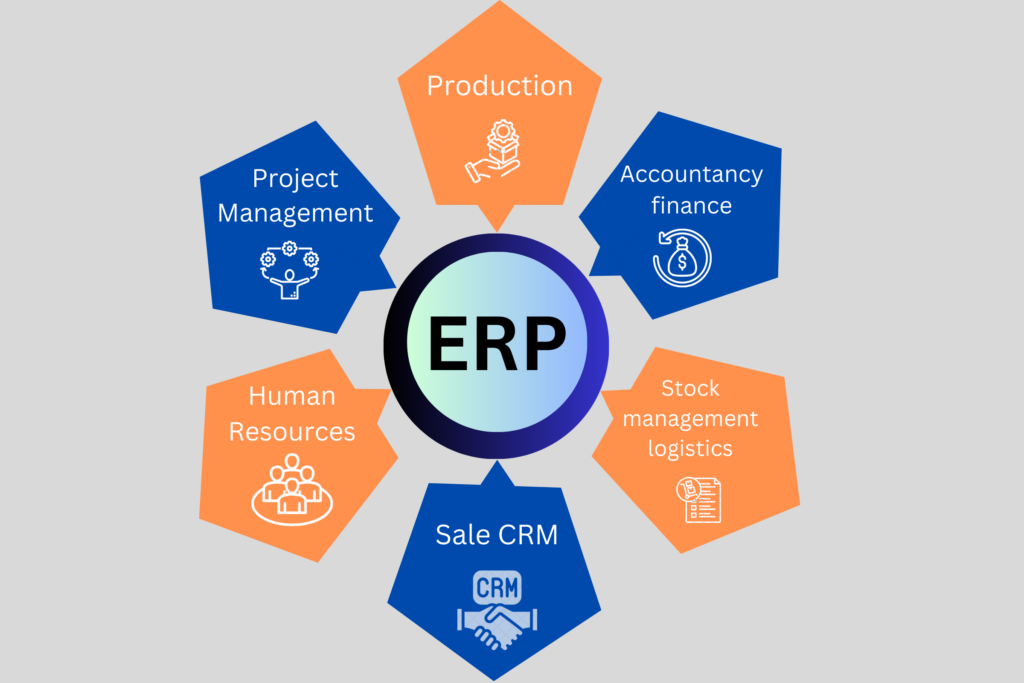Introduction:
Enterprise Resource Planning (ERP) systems streamline business processes by integrating various functions such as finance, HR, supply chain, and inventory into a unified system. This integration enhances efficiency, reduces operational costs, and improves decision-making with real-time data. ERPs also facilitate scalability, enabling businesses to grow without proportionate increases in overhead. Additionally, they ensure compliance with regulatory standards and enhance customer satisfaction by improving service delivery and response times.
ERPs are crucial for modern businesses as they centralize data, reducing redundancy and increasing accuracy. This centralization supports strategic planning and forecasting by providing comprehensive insights into business operations.

Business Value of ERP:
Process Integration and Efficiency:
- ERP systems integrate various business functions like finance, HR, supply chain, and inventory into one cohesive system.
- This integration eliminates silos, enhances collaboration, and streamlines operations, leading to increased efficiency.
Cost Reduction:
- By automating routine tasks and optimizing resource management, ERPs help in reducing operational costs.
- Centralized data reduces the need for multiple systems and decreases IT maintenance expenses.
Improved Decision-Making:
- ERPs provide real-time data and comprehensive insights, aiding in better decision-making.
- Advanced analytics and reporting capabilities help in identifying trends and making informed strategic decisions.
Scalability:
- ERP systems can scale with the growth of the business without proportional increases in overhead.
- They support expansion into new markets or the addition of new product lines with minimal disruption.
Compliance and Risk Management:
- ERPs ensure that business operations comply with regulatory standards and industry requirements.
- They help in managing risks by providing accurate, timely information and ensuring data integrity.
Enhanced Customer Satisfaction:
- By improving service delivery and response times, ERPs enhance customer satisfaction.
- Integrated CRM capabilities help in better managing customer relationships and improving service quality.
Importance of ERP:
Centralized Data and Reduced Redundancy:
- ERPs centralize data from various departments, reducing duplication and increasing data accuracy.
- A single source of truth ensures that everyone in the organization has access to consistent and reliable information.
Strategic Planning and Forecasting:
- Comprehensive insights into business operations support effective strategic planning and accurate forecasting.
- ERPs provide tools for budgeting, financial planning, and predictive analytics.
Automation of Routine Tasks:
- ERPs automate repetitive and manual tasks, such as data entry and order processing.
- This automation frees up employees to focus on higher-value activities that require human judgment and creativity.
Enhanced Collaboration:
- By providing a unified platform, ERPs improve communication and collaboration across different departments.
- Teams can work together more effectively, sharing information and coordinating activities seamlessly.
Flexibility and Adaptability:
- ERPs are designed to be flexible and adaptable to changing market conditions and business needs.
- They support process reengineering and continuous improvement initiatives, ensuring the business remains competitive.
Sustained Competitiveness and Innovation:
- ERPs provide the infrastructure needed for businesses to sustain competitiveness in a rapidly evolving market.
- They enable innovation by facilitating the integration of new technologies and business models.
In the end , discover how ERP systems revolutionize businesses by integrating critical functions like finance, HR, supply chain, and more into a unified platform. From enhancing efficiency and reducing costs to enabling informed decision-making and fostering innovation, ERP systems are indispensable for modern enterprises seeking sustained growth and competitive advantage. Explore the transformative power of ERP in streamlining operations, improving collaboration, and ensuring compliance, empowering businesses to achieve operational excellence and strategic success in today’s dynamic market landscape.
